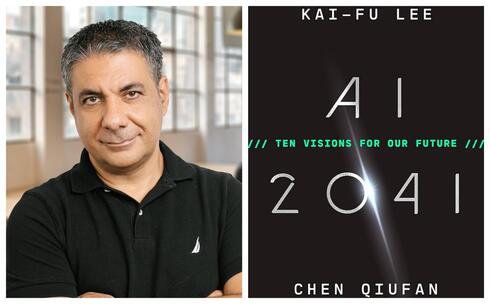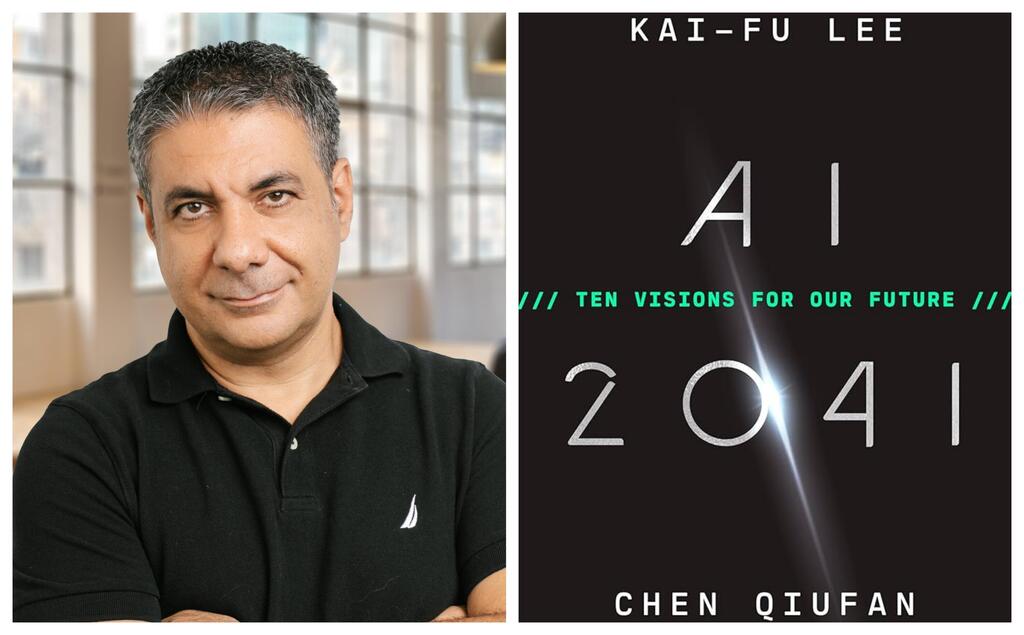
BiblioTech
CTech’s Book Review: A look at AI in the year 2041
Yaniv Golan, Managing Partner at lool Ventures, has joined CTech to share a review of “AI 2041” by Kai-Fu Lee and Chen Qiufan
Yaniv Golan is the Managing Partner at lool Ventures, a venture capital firm investing in early-stage startups and based in Tel Aviv. He has joined CTech to share a review of “AI 2041” by Kai-Fu Lee and Chen Qiufan.
Title: “AI 2041”
Author: Kai-Fu Lee and Chen Qiufan
Format: Book
Where: Home
Summary:
As a kid, I loved reading science fiction novels that painted vivid pictures of possible futures—their challenges, risks, and how they could reshape our society, economies, and even the cultural landscape. As a venture capitalist, constantly looking ahead, I've found this exposure incredibly helpful in my work over the years. However, recently I’ve hit a roadblock. Many of those once-distant futures have either materialized before my eyes or are just around the corner. That's why I'm always on the lookout for new ideas and fresh inspiration, and that's where this book comes in.
In “AI 2041”, Kai-Fu Lee and Chen Qiufan delve into a world set 20 years from now, where artificial intelligence is deeply woven into everyday life, transforming society in both inspiring and concerning ways. Their work combines storytelling with reflections, showcasing how different AI innovations could shape our reality. Through ten narratives, the book unfolds a potential tomorrow, making technological advancements feel real and emotionally moving.
The stories are set across diverse locations like Mumbai, Shanghai, and Lagos. Each narrative showcases a distinct aspect of AI—from deep learning and autonomous vehicles to natural language processing and quantum computing. After each imaginative story, Lee provides an analysis that connects the concepts to present-day developments and future possibilities.
Important themes:
“AI 2041” explores several key themes that illustrate how AI might shape our future:
- Ethical Dilemmas and AI Nudges: Many stories, like "The Golden Elephant," delve into the ethical complexities of AI nudges—how they can improve outcomes but also interfere in personal lives, raising concerns about data privacy and autonomy.
- Promise and Perils of Quantum Computing: In "Quantum Genocide," the dual potential of quantum computing is explored—its power to revolutionize encryption and computation versus the risks of destabilizing finance and enabling autonomous weapons.
- Cultural and Societal Impact: Set across diverse locations, the stories highlight how AI's integration will differ by culture, emphasizing that technology reshapes and is reshaped by its societal context.
- AI in Education and Human Potential: "Twin Sparrows" showcases AI’s role in personalized learning, emphasizing both the opportunities for expanding education access and the challenges of reliance on AI for development.
- Responsible Innovation and Existential Risks: Themes of responsible AI development and the need to mitigate existential risks are recurring, urging us to think about the importance of ethical guidelines and proactive policymaking.
What I’ve learned:
As someone who constantly looks to the future, this book reconnected me with the spark that first drew me to science fiction. One of the stories that resonated most with me was "The Golden Elephant," set in Mumbai. It focuses on a family using a deep learning-powered insurance program called Ganesh Insurance (GI). The story explores how personalized AI nudges can improve health outcomes and financial stability, but it also delves into the ethical dilemmas around data privacy and the unintended consequences of such systems—like the AI meddling in Nayana's romantic life.
Another striking story is "Quantum Genocide," which dives into the dangers of quantum computing, especially its potential to break encryption systems and destabilize global finance. It also warns of the existential risks of autonomous weapons fueled by quantum advancements, presenting a scenario that is both thrilling and terrifying.
Throughout the book, Lee’s commentary helps clarify the ideas behind each story, making complex concepts like AI tutoring or quantum risks accessible. For instance, in "Twin Sparrows," a story about AI in education, he connects the fictional narrative to real advancements in AI tutoring, building on the progress seen with tools like ChatGPT.
Critiques:
While the book is engaging, it sometimes leans toward an overly optimistic view of AI—almost as if it's an advocate for the technology. This might not resonate with readers who are more skeptical of big tech's influence. Though the stories touch on some of the societal challenges AI could bring, they don’t fully explore the potential resistance or the complexities of integrating AI across diverse political and cultural landscapes. The book effectively showcases opportunities, but a more in-depth look at the challenges of global adoption could have enriched it further.
Who should read this book:
If you're curious about the impact of technology on our future, “AI 2041” is an excellent choice. Kai-Fu Lee’s perspective as an AI trailblazer adds depth, thanks to his background at tech giants like Google, Microsoft, and Apple, and his role as a leading investor in AI. Chen Qiufan’s expertise in science fiction and storytelling offers a nuanced perspective on the intersection of technology, narratives, and cultural change. Together, their collaboration provides a stimulating exploration of the future of intelligence.
It’s worth noting that this book was written before the debut of ChatGPT, a tool that has since brought conversational AI into the mainstream. Back then, earlier AI models were impressive but still niche; now, tools like ChatGPT have made AI's potential much more tangible, accelerating the vision presented in “AI 2041”.
This book goes beyond sharing stories; it encourages us to envision a future where AI does more than assist us—it influences our values, reshapes our ethics, and challenges our understanding of humanity. Whether you are excited by AI or wary of it, “AI 2041” will stretch your imagination and prompt you to consider the transformations that await us. If you're not just curious about what the future might bring but also how we might shape it, this book provides a captivating roadmap to help navigate that journey.














